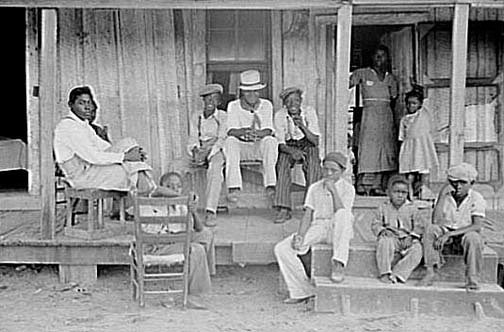
Set Two: Social Music; Disc One; Track Two: "The Wild Wagoner (Frolic Tune)" performed by J.W. Day (Jilson Setters). "Violin solo with guitar." Recorded in New York on February 27, 1928. Original issue Victor 21353A (42485).
The story of James William Day, a.k.a. J.W. Day, a.k.a. Blind Bill Day, a.k.a. Jilson Setters is vague and littered with half-truths. Here are the facts that we know: Born in 1861, Day was a self-taught fiddler from Catlettsburg, Kentucky. Day was blind, although whether he was born blind or was blinded is not known. During his youth, Day performed locally at dances and parties. He also occasionally supported himself by begging on the street while performing. He was known as Blind Bill Day during this period. At some point around 1906, Day had an operation that restored his sight. In 1926, Day met Jean Thomas, a folklorist and impresario who later ran the American Folk Song Festival near Ashland, Kentucky from 1931 to 1972. Thomas was impressed with Day's skill as a fiddler and with his repertoire of English folk ballads. Moreover, Thomas was convinced that the rural folk of the American southeast possessed traits that had been passed down from their Elizabethan English forebears almost unaltered. Thomas decided to manage Day. She changed his name to Jilson Setters and presented him as an old man who had lived in isolation in the mountains. She also claimed that the eye surgery that restored Day's sight had been only recently performed and that Day (now Setters) had been shocked by the modern world. Day was taken to New York to perform and record. He made ten sides for Victor, including this recording of "The Wild Wagoner," a staple of the standard fiddle repertoire. Day was also taken to England where he performed at the Royal Albert Hall for the King and Queen. He continued to perform throughout the 1930s and into the '40s at folk festivals, as well as recording for the Library of Congress. Jean Thomas wrote a heavily fictionalized biography of Day titled The Singin' Fiddler of Lost Hope Hollow. He died in 1942.
Here is a quote from a 1928 article written by Thomas about Day in which she provides a heavily romanticized picture of the man:
In a windowless cabin, hidden away in a high cranny of the Kentucky mountains, lived Jilson Setters, who, for all his sixty-five years, had never seen a railroad. Neither had he heard a phonograph nor a radio. His home-made fiddle and his ‘ballets’ were good enough for Jilson Setters and mountain folk.
from: “The Last Minstrel” by Jean Thomas, The English Journal, December, 1928
"The Wild Wagoner" is the second of seven tracks in a row that feature the fiddle, either solo or in combination with various instruments. As mentioned above, it is a standard part of the fiddle repertoire, most often performed at dances or "frolics." On this recording, the fiddle plays the melody line while a guitar (played by an unknown hand) keeps the rhythm. The song is in the key of C, a less common key for old time fiddle music than A, G, or D. The title of the song often varies according to the location of the musician playing it, e.g. "The Kentucky Wagoner" or "The Missouri Wagoner."
While it is tempting - especially on a set as laden with meaning as the Anthology - to search for some sort of sub-textual import for each song, not every song has to have a meaning. The purpose of the songs on this volume, after all, was to be played at social functions for dancing. That's all. Sometimes a cigar is just a cigar. It is important to remember that none of the songs on the Anthology were thought of as "art" by the people who performed them. All of these songs had a function. The songs on the "Ballads" set told a story. The songs on the "Social Music" set are either songs for dancing or for worship. The songs on the "Songs" set are simply designed to amuse. It is only relatively recently that popular songs were supposed to do something more than act as diversions. It is therefore somewhat ironic when people complain that - for example - Lady Gaga's music is "just" music for dancing. While Uncle Bunt Stephens and J.W. Day would probably not responded to her music, I can't imagine that they would object to the message when Lady Gaga sings "It'll be okay...just dance."
The Shameless Plug Department - The Omen: Check out the long awaited(?) fourth episode of the "Where Dead Voices Gather" podcast. On this all-blues episode, you'll hear New Year's greetings from Lightin' Hopkins and Mary Harris, as well as Delta Blues by Son House, Willie Brown and Charlie Patton. You'll also hear recordings by more obscure figures like Geeshie Wiley, Blind Joe Reynolds, William Harris, and more. Also available on iTunes! Subscribe today so you don't miss a single episode. It's free and it doesn't hurt. Who can ask for more?
You can also become a fan of "Where Dead Voices Gather" on Facebook and follow us on Twitter. Where Dead Voices Gather: Using today's technology to promote yesterday's music!
Who is mountnmonkey? Is it one guy? Is it the whole group? Who ARE these guys? Well, they're good, whoever they are! Here they are performing a variation of "The Wild Wagoner" titled "Tennessee Wagoner" on fiddle with mandolin and at least three guitars. Good stuff!
Download and listen to J.W. Day (Jilson Setters) - "The Wild Wagoner"








